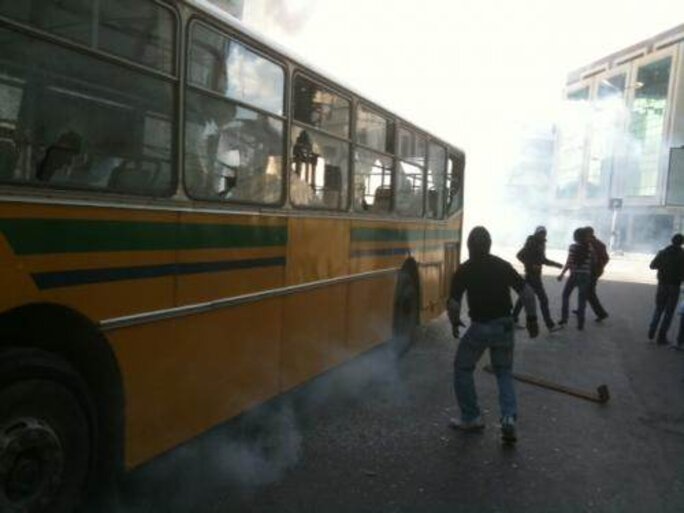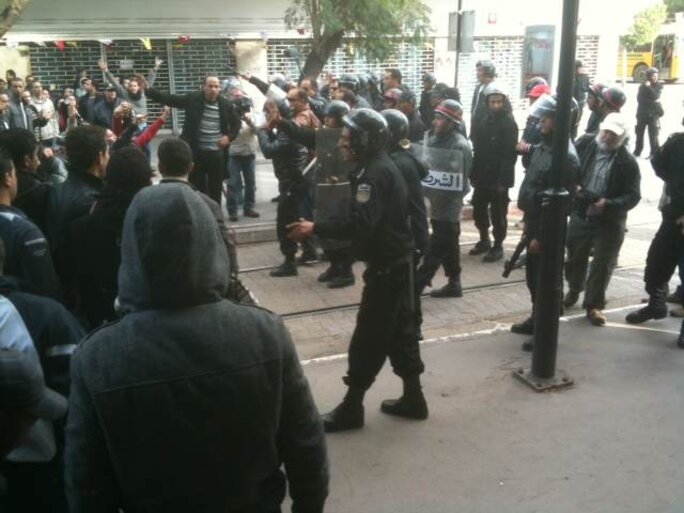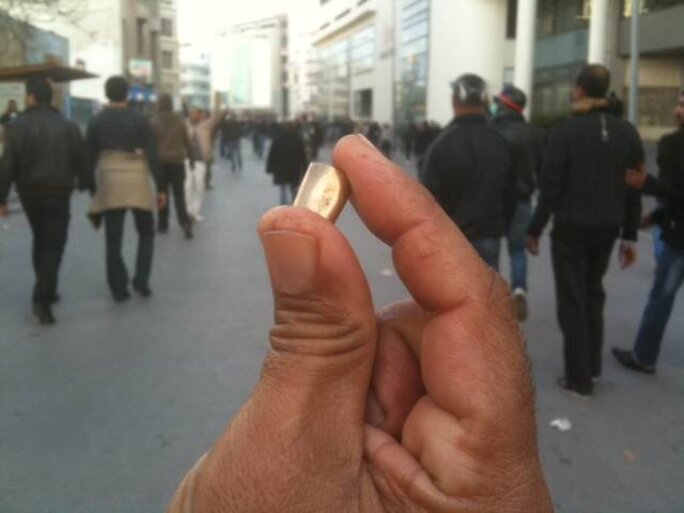In what has already been called the 'Jasmine Revolution', Tunisian President Zine al-Abidine Ben Ali fled the country for Saudi Arabia on Friday evening. Speaker of the Tunisian parliament, Foued Mebazaa, was on Saturday appointed interim president and free elections for the post have been promised within two months. The events on Friday were the culmination of three weeks of angry protests across the country against spiralling food prices, unemployment, corruption and human rights abuse. Mediapart's Thomas Cantaloube reports here from the capital Tunis where he witnessed the last violent hours before Ben Ali was forced out of more than two decades of iron rule.
-------------------------
It was about 2 p.m. in Tunis when, in front of the interior ministry, Friday's peaceful mass demonstration became suddenly transformed, and along with it, Tunisia.
People were wandering around without any particular purpose, some of them astounded at seeing themselves able to express a political opinion in public. Others, more vehement, were shouting "Ben Ali Out" and "Away with him". The rare banners being brandished displayed hand-written slogans in Arab, French or English reading "Fredom", "Give us our money back" and "Trabelsis are corrupt".1

Enlargement : Illustration 1

Some among the crowd held up photos of those who had died in the confrontations over the past few days. Occasionally, people began singing the Tunisian national anthem.
In just a few hours, the crowd grew from just a few hundred into several thousands, entirely filling the avenue Habib Bourguiba, the principle artery of the Tunisian capital. While most were young adults, there were also families and old people.
One group of four young graduates appeared unable to stop talking, as if a free-running torrent held back too long had finally escaped a burst dam. Every subject came up, from the extraordinary corruption of the Tunisian government, the absence of any future hope for the young, the lack of freedom, the hatred towards the president's in-laws - the Trabelsi family - and the role of France.
A few young men climbed the canopy of the interior ministry building to wave the Tunisian flag above it. Suddenly there was a buzz running through the crowd; "It's the body of a martyr", came the announcement, indicating the passing of the body of one of those who died in the clashes, and everyone raised their arms into the air.
Then there was a surge of people coming from November 7th Square, so-named after the date of President Zine al-Abidine Ben Ali's investiture in 1987. A police bus was moving, then came the muffled explosions of tear gas launchers. Some of the canisters flew across in arcs, landing bang in the middle of the crowd. Others were fired into the terraces of surrounding buildings where some of the crowd were also standing. There was a stampede as people tried to flee by the small streets leading from the avenue.

Some youths began picking up stones and throwing towards where they guessed the police were standing. Then there were shouts "No! No! Don't retaliate". Tear gas smoke filled the air and then everyone began shouting, in Arab and French: "Ben Ali assassin! Ben Ali assassin!"
Along another avenue, running parallel with the avenue Habib-Bourguiba, a strange scene played out. Young demonstrators had gathered around a police bus where policemen had raised their arms in the air in a sign of appeasement. Both parties began discussing together, and exchanging bottles of water to counter the effects of the smoke.
Then came more burst of tear gas launchers. The youths rushed off to arm themselves with stones and wooden branches and returned to the bus which they captured within minutes. They gathered everything they could find inside, including smoke bombs and tear gas cartridges, waving them like the spoils of war. Indeed, the situation had begun to resemble war.
Many people were crying from both the effects of the tear gas and from rage. "Do you see how they treat us," asked one of them. "They want to silence us, but we won't stop as long as this clique of murderers remains in power." People stop to talk despite being in the middle of an urban guerilla war, something that most if not all will have only witnessed in films until now. They notably talk about members of the French government, having all heard the comments of French foreign affairs minister Michèle Alliot-Marie and Prime Minister François Fillon. "They gave me stomach pains," said one man, in his late thirties. "If France doesn't help us, we're finished."

Enlargement : Illustration 3

As the afternoon progressed, the police reacted with increasing violence, raining down blows with their batons, chasing isolated demonstrators and beating them up when they fell. Although Ben Ali had demanded, in his speech the previous night, that the police no longer shoot bullets in the clashes, there remained a considerable arsenal of other weapons at their disposal, and they were soon firing tear gas in constant volleys.
It became clear that the security forces strategy was to empty the capital's symbolic thoroughfare, avenue Habib Bourguiba, of all demonstrators, and after an hour most people had left, except for groups of youths who wanted to fight. Amid this situation, on one street corner, some fifty or so peaceful demonstrators were holding a sit-in, in front of a cordon of police who showed no animosity. Once again, there was an exchange of water bottles.

Enlargement : Illustration 4

But just when this appeared as if to be a moment of fraternisation, and in a fraction of a second without any warning beforehand, the men in blue began a baton charge. It was perfectly symbolic of the character of the crisis in Tunisia; at one moment all is calm and restrained, the next everything erupts in fighting and the revolt overwhelms the authorities. One evening Ben Ali uses appeasement, the next day he strikes back.
-------------------------
1: The 'Trabelsis' are the family of Leïla Trabelsi, wife of deposed president Ben Ali, by whom she has three children. The enrichment of Trabelsi and her relatives under Ben Ali's regime, the part subject of a recent report in The New York Times, outraged many Tunisians.
The avenue Habib Bouguiba was finally emptied of everyone shortly after 4 p.m. Everyone, that is, except for the hundreds of police and troops backed by tanks. On the ground lay dozens of abandoned shoes. The journalists present, who until then had been able to work unhindered, were firmly told to leave the spot. In the sidestreets, clusters of youths were continuing to harry the police who now counted as many plain clothes officers as those in uniform. One of the plain clothes' policemen pointed a handgun towards youths throwing stones. He took shelter, loaded the gun, and again threatened the thinning demonstrators. He did not shoot. Not on that occasion, at least.

Enlargement : Illustration 5

A group of peaceful demonstrators who had not left the area quickly enough took refuge in the neighbouring buildings and hotels. One young couple appear terrorised, and speak of their fear of being killed. News of the day's events begin arriving via mobile phones; clashes all over Tunisia, the road to Tunis airport has been cut off, just like that leading to the presidential palace, the authorities have lost control.
In a nearby restaurant, 60 people are huddled around a television screen showing the Al Jazira news channel, which carried non-stop reports and images showing security forces repeatedly firing bullets and beating up demonstrators. The Tunisia TV channel, meanwhile, was showing a documentary about animals.
The police outside were on edge. They had begun entering the surrounding buildings looking for demonstrators and cameramen filming them live.
Mobile phones began ringing with the news that the government had been dissolved, a State of Emergency decreed, and that the Trabelsi family had tried fleeing the country by plane. Even Ben Ali's future appeared uncertain. As the sky turned orange and night fell on Tunis, everything suddenly seemed possible. Just after 6.30 p.m. the state television channel announced that Presdent Ben Ali had left the country and that a temporary government had taken over the running of affairs, led by Prime Minister Mohammed Ghannouchi.
-------------------------


